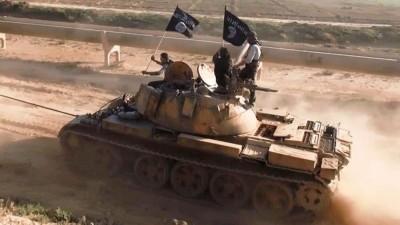The “State Sponsors” of ISIS, Saudi Arabia, Qatar, Turkey: Why are they No Subject to Sanctions?

As the US and Europe prepare another round of sanctions against Russia over the ongoing Ukrainian conflict, the third round of such sanctions since the conflict began shortly after the Euromaidan unrest resulted in the installation of a NATO-backed regime in Kiev, a curious and inexplicable oversight appears to have been made.
While wild accusations have been leveled against Russia over its involvement over the violence in Ukraine, claims ranging from covert support up to and including unsubstantiated claims of a “full scale invasion,” prominent media organizations across the Western World have for years reported a flow of cash, weapons, equipment and fighters from America’s allies in the Persian Gulf as well as from nations like NATO member Turkey, and into the conflict raging within Syria’s borders.
While baseless claims leveled against Russia have served as ample justification for the West to continue leveling sanctions against Moscow, no sanctions have as of yet been leveled against the overt sponsors of militancy and, in fact, terrorism in Syria. So widespread has state-sponsored terrorism become in the Middle East that what began as a limited proxy war against Syria has transformed into an immense regional army with tens of thousands of paid soldiers requiring millions of dollars a day to operate across multiple borders and confounding the forces of Iraq, Syria, and Lebanon combined.
ISIS is State-Sponsored, So Why Aren’t These States Being Sanctioned?
Clearly, the Islamic State in Iraq and Syria also known as ISIS or ISIL, are the benefactors of vast state-sponsorship and yet the West has not identified nor condemned these sponsors, let alone move toward leveling sanctions similar to what it is seeking to impose upon Moscow.
News articles by prominent British and American news outlets like the Daily Beast’s “America’s Allies Are Funding ISIS,” the London Telegraph’s “How Isil is funded, trained and operating in Iraq and Syria,” and the Daily Mail’s “Cameron tells European leaders to ‘be good to their word’ and stop funding ISIS with ransom payments,” give explanations ranging from outright admissions that Saudi Arabia, Qatar, Jordan, and Turkey are directly arming, funding, aiding and abetting ISIS, to descriptions that read like an immense money laundering operation, to ridiculous claims including “ransom payments” and “robbed banks” have been behind ISIS’ regional rise to menace.
At one point in the Daily Beast’s article it claims, “the U.S. has made the case as strongly as they can to regional countries, including Kuwait. But ultimately when you take a hands off, leading from behind approach to things, people don’t take you seriously and they take matters into their own hands.” If ever there was a case to use sanctions to be “taken seriously,” it would appear to be in this case, yet sure enough, no sanctions appear to be on the table.
Systematic Hypocrisy Undermines Legitimacy
American and European hypocrisy so stark undermines the legitimacy of both their governments and institutions as well as their agenda domestically and abroad. Condemning and leveling sanctions against Russia for allegedly doing in Ukraine what the West is openly doing in Syria and Iraq with its own immense proxy army leaves the global audience to decide between Russia managing a crisis on its borders and a West meddling thousands of miles from its borders.
Beyond sanctions, the West’s presence across the Middle East has had a negative impact on public perception both across the region and back home. This is owed to a larger pattern of hypocrisy, deceit, and meddling that has been done under various pretenses but for obvious self-serving interests.
What West’s Missing Sanctions Tell Us About Its “War” on ISIS
Versus Russia, the United States and Europe have used every means at their disposal to support their regime of choice in Ukraine as well as undermine both eastern Ukrainians and Russia who has emerged as their champion upon the international stage. From multiple rounds of sanctions, to threats of direct military force, and an overall strategy of geopolitical and military encirclement of Russian territory has been pursued to exact from Moscow concessions regarding Western designs in Ukraine.
Why hasn’t a similar full-spectrum commitment been used to render from Persian Gulf monarchies the same desired capitulation to Western desires in the Middle East and more specifically, in regards to ISIS? The answer is simple, the West does not desire an end to the massive state-sponsorship of ISIS via its own allies, namely Saudi Arabia, Qatar, Turkey, Jordan, and others.
It appears instead that the West and its partners are pursuing a dual-track strategy of inflaming the region with barbarism and violence so appalling, global public opinion will desperately beg for military intervention by the United States and its allies it has been so far utterly unsuccessful selling to the public under any other pretense.
The lack of biting sanctions against state-sponsors of terrorism aiding and abetting ISIS in both Iraq and Syria is an indictment of the West’s lack of sincerity in its “war” on ISIS. Short of a signed confession, no other indicator could be more telling of yet another war being sold within a pack of lies than a West eager to sanction every nation on Earth to the point of isolating itself to exact global obedience, but absent of sanctions amid overt support for terrorists it believes are so dangerous it must militarily intervene in Iraq and Syria.
Ulson Gunnar, a New York-based geopolitical analyst and writer especially for the online magazine “New Eastern Outlook”.

